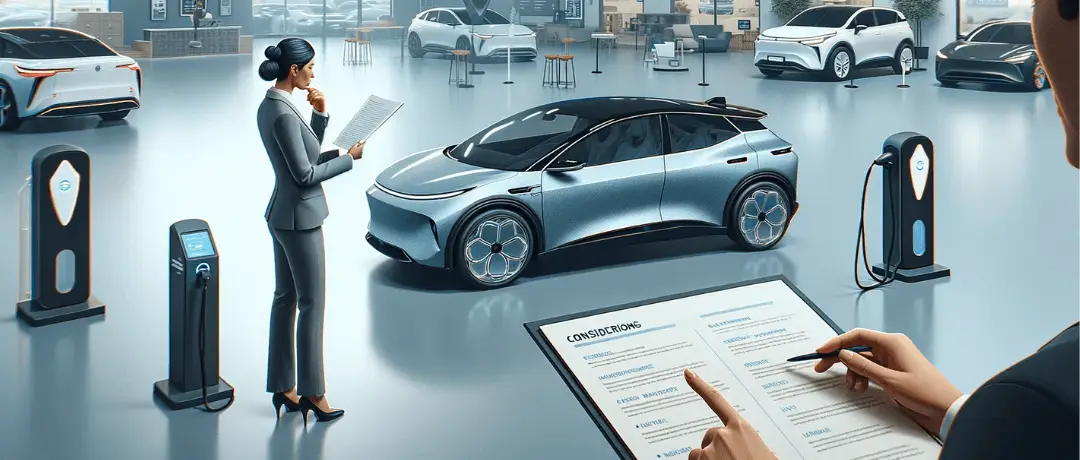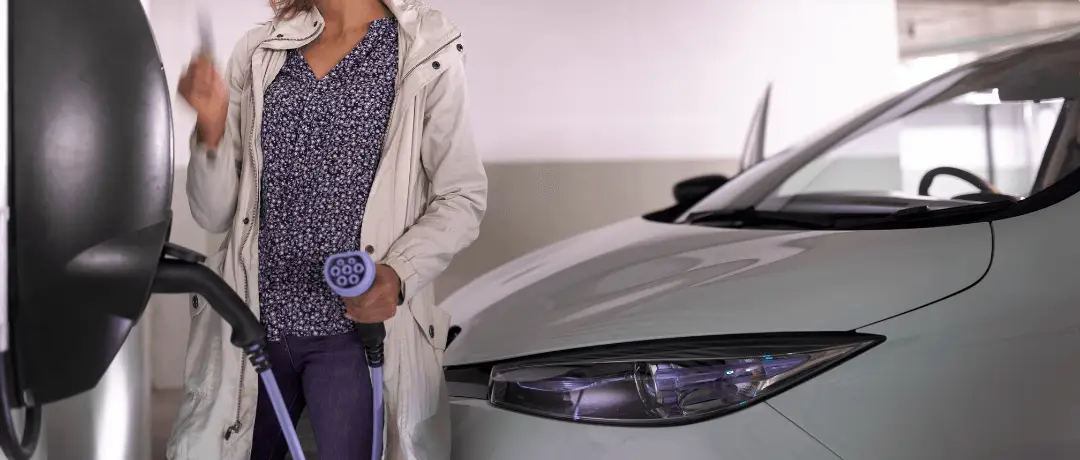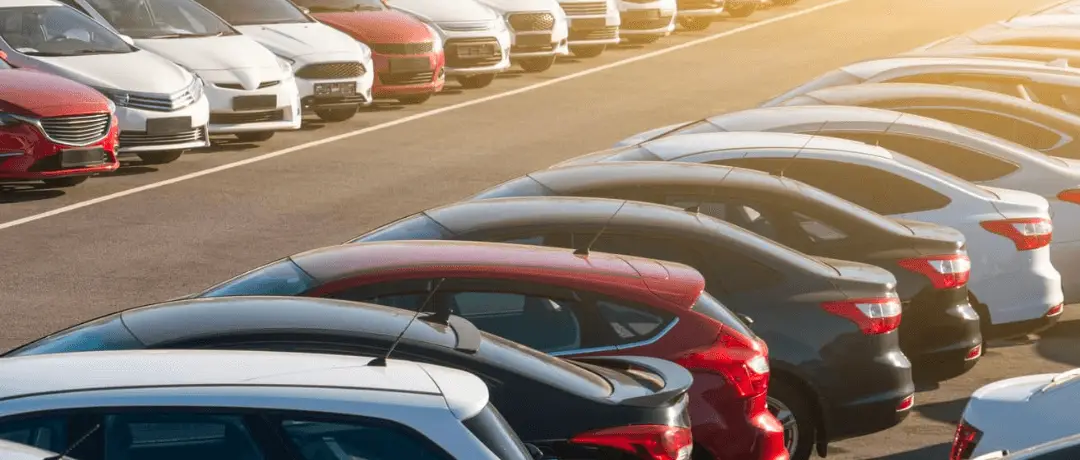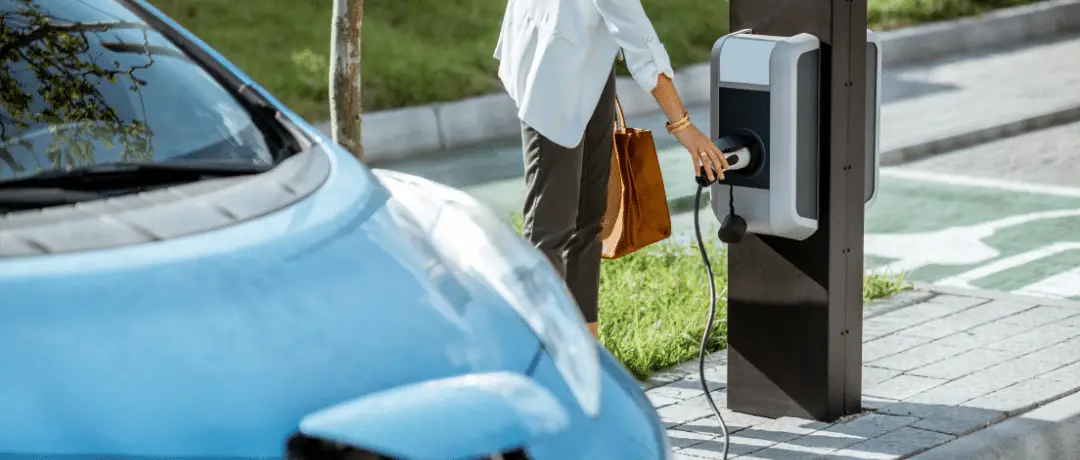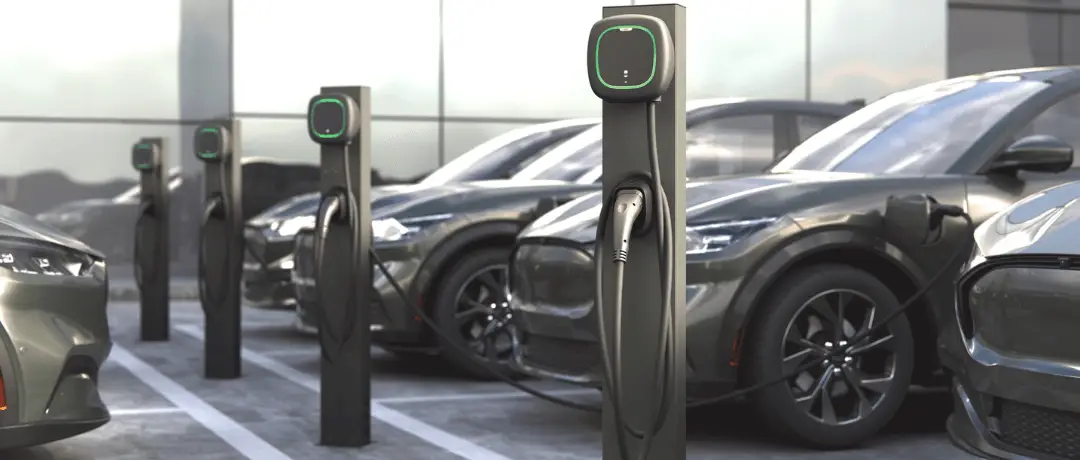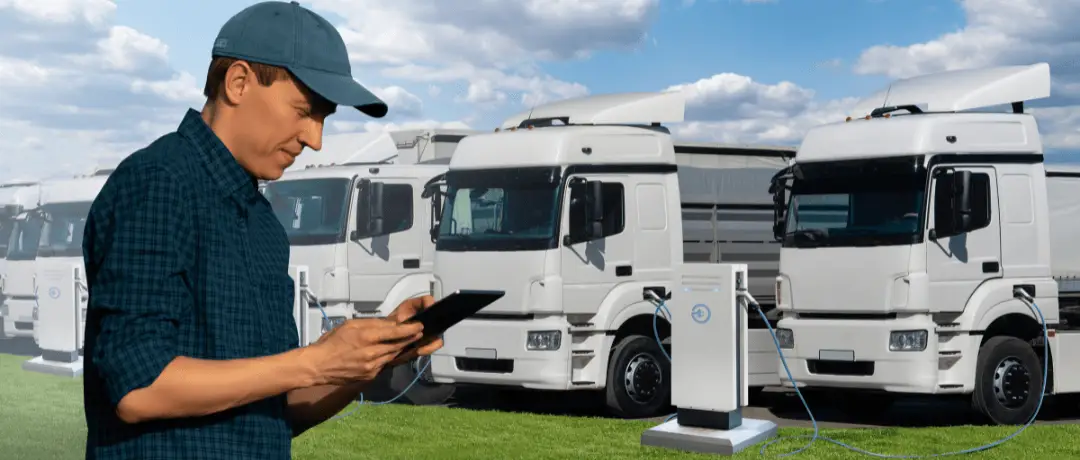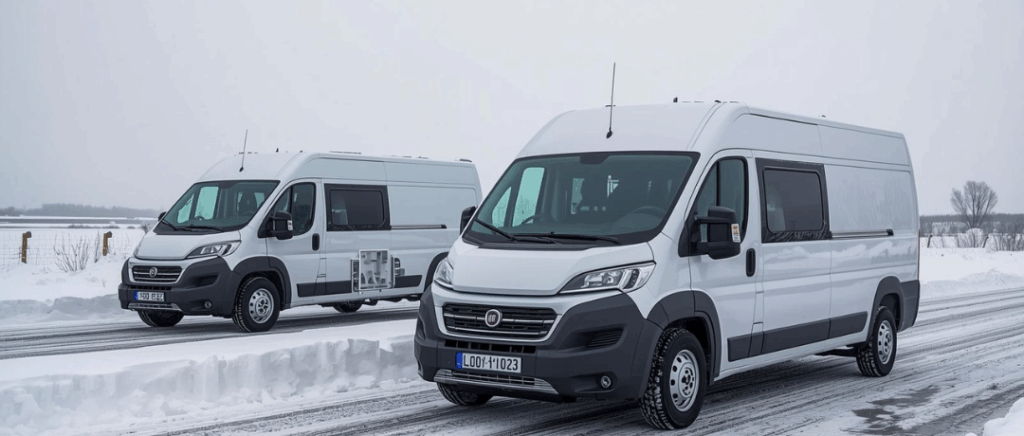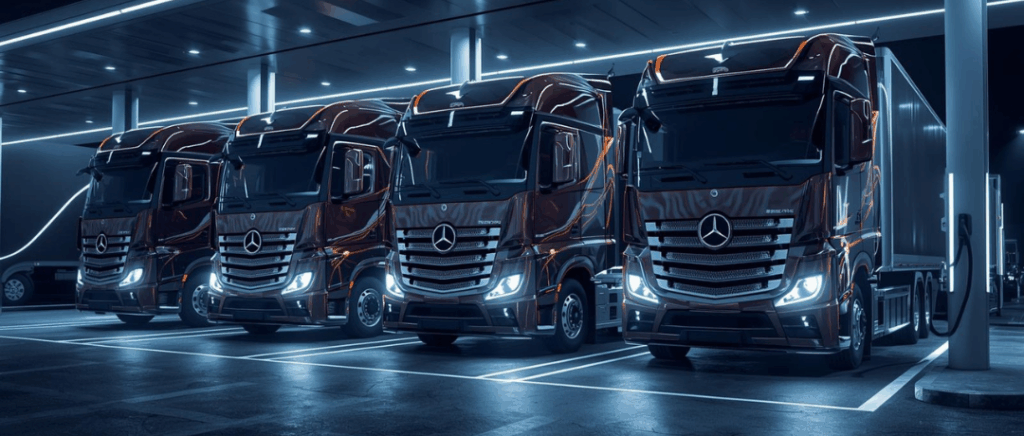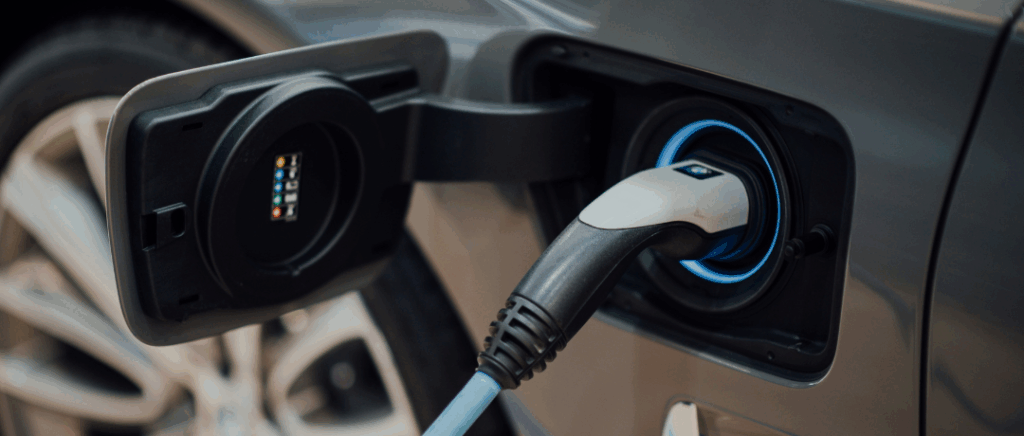Discover our exclusive offers
The different types of electric car leasing for companies
Long-term leasing
Long-term leasing, or Location Longue Durée, is a 1 to 5 year leasesoffering a fixed rent including services such as :
- maintenance,
- assistance,
- and financial loss cover.
At the end of the contract, the lessee may return the vehicle or purchase it by negotiating a buy-back price with the lessor. This model differs from Lease to Own (LTO) in that the redemption price is not fixed at the outset.
With the growing adoption of electric cars, full service leasing is becoming an increasingly popular option. an increasingly attractive option. This type of financing is particularly attractive to businesses, who see it as an opportunity to electrify their fleets.
For more information, 50,579 electric vehicles would be leased within a companyrepresenting 9 % of the market in 2023according to a study by Sesamlld.
The cost of long-term leasing depends on various factors such as :
- mileage,
- the price of the vehicle,
- the duration of the contract,
- and services included.
What's more, there are many advantages to leasing an electric car:
- budget control thanks to fixed rents,
- the flexibility to test drive a vehicle before considering a purchase,
- and the possibility of regularly changing your vehicle for a more recent model.
Read our article about :
At the same time, SMEs and VSEs can take advantage of a number of tax breaks by opting for the leasing of electric vehicles.
These include exemption from Company Vehicle Tax (TVS) for vehicles emitting less than 60 g/km of CO2.
This method of financing, which is considered an expense rather than an investment, also improves :
- the capital management
- and debt ratio.
What's more, the LLD ensures the regular renewal of vehicles guaranteeing optimum performance and reinforcing the company's brand image.
In addition, the government offers a number of financial incentives to encourage the transition to electric mobility, such as the conversion premium. This aid, which can be combined with other local schemes, facilitates access to electric vehicles for businesses.
In addition, the ADEME Green Loan offers a financial support for energy transition projects by SMEs and VSEswith loans of up to €1 million.
Read our article about :
Similarly, as an SME (or any other type of business), it is crucial to adopt effective strategies to optimise the preservation of your cash flow.
The first step is to optimise the Total Cost of Ownership (TCO) of your vehicle fleet.
The TCO, which covers all the costs associated with owning a vehicleallows you to manage expenditure proactively taking into account regulatory and technological developments and the company's needs.
Rigorous TCO management helps to :
- identify the real costs of the park,
- assess the return on investment,
- and determine the right times to renew vehicles.
Monitoring the energy consumption of electric vehicles is also essential.
By choosing fuel-efficient vehicles and by adopting a fluid driving styleYou can reduce your energy costs, especially with the recent rise in electricity prices. Using eco" mode on electric vehicles can also contribute to substantial savings.
By opting for a long-term lease (LLD), you can avoid additional expenses such as :
- repairs,
- resale costs,
- and company car tax, as these charges are covered by the lessor.
This option allows better control of cash flow while reducing vehicle purchase and maintenance costs.
Last but not least, electric vehicles offer fuel savingsdespite rising electricity costs. Charging vehicles during off-peak hours can mitigate these costs, offering a opportunity to save more.
Read our article about :
In accounting, the company cars are recorded on the company's balance sheet on the basis of their actual acquisition cost, including :
- the purchase price,
- transport costs,
- accessories, less discounts.
Due to their depreciation, these vehicles are depreciated as fixed assets. Private hire cars also benefit from a depreciation allowance, but with specific ceilings.
Depreciation is calculated by deducting the non-deductible depreciation limit from the financial value of the vehicle and dividing the result by the depreciation period. The financial value includes :
- options,
- the list price,
- transport and delivery costs, after deduction of discounts.
Amortisation of passenger cars and light commercial vehicles on a straight-line basis over 4 or 5 yearswith rate of 20% or 25% per year.
For companies subject to VAT, this tax is recoverable on the lease payments for commercial vehicles, but not for passenger cars. Fuel is also eligible for full VAT recovery for electric vehicles and certain other types of fuel, except petrol.
The government is encouraging the use of clean vehicles through tax measures such as :
- non-deductible depreciation ceilings,
- and tax exemptions for low-polluting vehicles.
Electric vehicles benefit from full or partial tax exemptions for tax on the use of passenger vehicles for economic purposes.
Read our article about :
The following options are available when you take out a long-term leasing contract renewal of a contractwhich implies a new agreement with a new vehicle. Conversely, the extension simply extends the duration of the existing contractsubject to agreement between the parties.
The extension process requires a revision of mileage and contract durationprovided that the initial conditions are respected. To avoid complications, it is recommended to apply for an extension 3 to 4 months before the end of the contract.
If extension is not possible, there are alternatives, such as :
- returning the vehicle
- or switching to a medium-term lease (MTL)
- it offers greater flexibility with contracts from 1 to 24 months,
- It includes services such as maintenance and assistance,
- It is useful for professionals waiting for their vehicle to be delivered.
Finally, to avoid pitfalls when extending your contract, it is crucial to respect the clauses of a contract, in particular the mileageand to ensure that the vehicle is in good condition before the return.
Careful attention to these details will ensure that the vehicle can be used for as long as possible without any further complications, while awaiting delivery of the new model.
Read our article about :
As a reminder, financial risks are also minimised with full service leasing:
- no initial contribution,
- possibility of surrender at the end of the contract,
- and includes maintenance and support services, facilitating frequent fleet renewal.
Some models stand out on the long-term leasing market because of their performancestheir autonomiesand their advanced technologiesto meet a wide range of user needs.
Here are a few examples:
- the Tesla Model 3,
- the Renault Zoe E-Tech,
- the Peugeot e-208,
- l'Audi Q4 e-Tron,
- and the MG4.
The growing popularity of these electric vehicles in company fleets can be explained by the growing confidence in their ability to meet the needs of our customers. reliabilitytheir qualityand thecontinuous improvement of their autonomymaking them an emerging industry standard.
Read our article about :
Medium-term leasing
Medium-term leasing (MTL), a new 1 to 24-month renewable rental contractoffers a an intermediary solution between long-term leasing and short-term leasing. However, this flexibility has a higher costjustified by the short rental period and the lessor's efforts to re-lease the vehicle after you have used it.
LMD is therefore ideal for temporary solutionFor example, to bridge the gap between two leasing contracts or to meet specific needs such as a long business trip.
The LMD offers a number of advantages, including :
- great flexibility
- and peace of mind thanks to the insurance included,
- such as the anti-theft guarantee,
- comprehensive insurance,
- and 24-hour assistance.
It is essential to understand the distinctions between the various types of finance. The LMD, unlike the LOA or LLD, does not allow the vehicle to be bought back at the end of the contractbut includes insurance and maintenance, making it an all-inclusive package.
Read our article about :
In fact, the LMD is distinguished by its flexibility It offers companies the opportunity to rent with no down payment and no increased rentAll the while benefiting from included services such as servicing, insurance and maintenance.
What's more, it adapts to the specific needs of companies by allowing them to choose :
- the vehicle,
- the duration of the contract,
- monthly mileage,
- and the possibility of renewing or changing the package at the end of the contract.
By opting for the LMD, companies can not only control their budget with fixed monthly paymentsbut also strengthen their commitment to the environment.
Read our article about :
Leasing with a purchase option
Leasing with a purchase option (LOA) enables companies to hire a vehicle for a period of 2 to 5 yearswith the option of buying it at the end of the contract or returning it.
Naturally, the cost of an LOA varies according to :
- mileage,
- of the price of the vehicle,
- the duration of the contract,
- services included,
- and the residual value of the vehicle.
Good to know : Different documents are required to take out a leasing offer, depending on whether you are an individual or a company.
Note that the terminating a LOA contract is possibleHowever, compensation may apply.
However, there are alternatives to avoid these costs, such as theearly purchase of the vehicle or transfer of the contract.
Finally, the choice between LOA, LMD (Medium-term leasing) and LLD (Long-term leasing) depends on the tenant's specific needsYou'll be able to choose from a range of options, such as annual mileage or the flexibility you want.
The LOA remains a advantageous option for those who want to try out electric mobility while benefiting from attractive financial conditions.
Read our article about :
The question ofpurchase of an electric vehicle for private or professional use is a subject that needs to be addressed.
The financial assistance available varies according to the status of the buyer. For individuals, the environmental bonus of up to €7,000 depending on incomewhile companies can benefit from local subsidiessuch as 6,000 available in Île-de-France.
La conversion premiumwhich encourages the replacement of old polluting vehicles, is offering up to 6,000 for individualswhile companies receive a fixed amount of €2,500.
In terms of taxation, companies have a significant advantage. They can :
- take advantage oftax exemptions,
- write off the vehicle up to €30,000,
- and benefit from partial or total free registration in certain regions.
In addition, if the company makes a vehicle available to an employee, a an allowance of 50 % is applied to the benefit in kindmaking it a financially attractive option.
As each situation is unique, it is essential to analyse these parameters in order to make the most appropriate choice.
Read our article about :
Leasing electric cars as a CSR lever
The leasing of electric cars is one of the most attractive an advantageous solution for companies wishing to renew or electrify their fleet without the financial constraints linked to the purchase.
In addition, the type of rental allows you to have access to the latest models while avoiding depreciation and high maintenance costs. But that's not all: leasing offers :
- a financial flexibility,
- with monthly payments often lower than loan repayments
- and allows you to benefit from the latest technological innovations.
By choosing this option, companies reinforce their commitment to Corporate Social Responsibility (CSR), contributing to reduction incarbon footprint and promoting a healthier environment. What's more, electric vehicles, which emit no exhaust fumes, are perfectly in line with global climate objectives, particularly those of the Paris Agreement.
For employees, access to electric cars can improve their satisfactionthanks to more pleasant journeys and tax benefitsIt also reinforces their feeling of working for a company that cares about the environment.
Read our article about :
What you need to know about electric vehicle leasing for businesses
Before taking out an electric car lease, it's essential to understand the financial, contractual and legal aspects.
Firstly, as explained above, it is important to know that the cost of monthly instalments depends :
- of the model,
- the duration of the contract,
- of annual mileage,
- and maintenance costs,
On the other side, the security depositgenerally between 10 and 20 % of the price of the vehiclecan be reimbursed under certain conditions. It should also be noted that maintenance costs are often lower than those for a thermal vehiclebecause of the simplicity of the electrical components.
Thirdly, the duration of the contractvarying from 24 to 72 monthsinfluence :
- the amount of the monthly instalments
- and the amortisation of the total cost.
What's more, choosing a mileage rate adapted to its use is important to avoid additional costs. Visit cancellation conditionsThese include compensation and strict requirements on the condition of the vehicle and compliance with mileage limits.
We can also highlight the existence of the manufacturer's warranty, protecting against manufacturing defects, with possible extensions.
But that's not all: the supplementary insurance can cover specific types of damage, such as that caused when recharging. Insurance, several guarantees are availablecovering various aspects such as :
- the flight,
- assistance,
- broken glass,
- and all-accident damage,
There are a number of tax advantages to leasing electric cars in France, including theexemption from TVS and the deductibility of rental income from professional income.
Read our article about :
The most important thing to know when taking out a leasing contract for an electric car is the returning a leased vehicle.
Whether it's an LOA or LLD, it's essential to know the ins and outs in order to avoid unexpected costsThese average €800, according to Le JSL.
For a smooth transition, it is crucial :
- return the vehicle in good condition,
- respect the return date of the vehicle,
- and monitor mileage overruns to avoid penalties,
Before the return, a thorough cleaning of the vehicle is recommendedideally by a professional. It is also advisable to carry out the necessary maintenance and repair minor damage to avoid higher imposed costs by leasing agencies.
Finally, make sure you submit all administrative documentsThis will ensure that the return of the vehicle goes smoothly. At the end of this procedure, a a statement of return will be drawn upThis will include details of any charges to be paid.
Read our article about :
To complete the above, the the costs associated with leasing are not limited to the monthly instalments. Some additional costs are to be expected, such as :
- top-up charges,
- vehicle transfer costs,
- all-risk insurance costs,
- and disposal costs at the end of the contract.
Although leasing remains particularly advantageous for companies wishing to regularly update their fleet with the latest electric models, there are constraints, such as :
- mileage limits,
- the obligation to take out expensive insurance,
- and potential restoration costs at the end of the contract.
Read our article about :
As for the end of a leasing contract for an electric car in France, this is governed by strict regulationsThese are mainly taken from the Civil Code and the Consumer Code.
It is essential to respect the return date stipulated in the contract and to plan ahead:
- redeem,
- return,
- or renew the lease.
Each of these options has its advantages and disadvantages, depending on the tenant's needs and financial situation.
Renewing a lease allows you to benefit from the latest innovations without any acquisition costswhile the buy-back confers ownership of the vehicle but means that future maintenance costs will be borne by the owner.
The choice between these options should be guided by a careful assessment of the condition of the vehicle and the marketIt also requires you to think about your long-term needs. Selling the vehicle to a private individual, while potentially more profitable, also involves risks.
Read our article about :
To take things further, we have the lease transfer which allows you to break a car rental contract early, whether for a LOA or a LLD.
This option, which involves assign the contract to a new buyeris often more advantageous than other alternatives, because it avoids heavy financial penalties. Contrary to popular belief, the cancelling a long-term hire contract is simplerThis may be for personal, professional, economic or legal reasons.
If you are unable to pay the monthly instalments, the rental company may terminate the contract without the agreement of the lessee, resulting in the return of the vehicle..
Worth noting the 14-day cooling-off period After signing the contract, however, there is a small window of opportunity to change your mind.
As far as the LOA is concerned, this type of contract is appreciated for the possibility of acquiring the vehicle at the end of the contract. However, the cancellation options are costly. Returning the vehicle early obliges you to pay the remaining monthly instalments in fullwhile theearly purchase or resale after acquisition may prove to be financially disadvantageous.
All in all, leasing remains the most economical solution.
Read our article about :
Electric vehicle leasing for businesses: our advice
When you buy an electric car, it's essential that you negotiate insurance to avoid high costs.
As explained above, themaintenance of these vehicles is generally less costly than that of internal combustion vehicles despite the substantial initial investment, reducing the cost of insurance.
That said, there are a number of specific factors to take into account, such as :
- assistance in the event of a power cut,
- or cover for damage linked to recharging.
The electric car insurance tends to be cheaper than those for internal combustion vehicles, as these cars are often used for shorter journeys and are therefore less likely to be involved in serious accidents.
However, the the price of insurance varies according to the model and value of the vehicle. For example, an SUV like the BMW iX2 eDrive20 being more expensive to insure than a city car such as the Renault Twingo E-Tech.
To reduce the cost of your insurance, it is advisable to define your precise needs before choosing a cover. Use an insurance comparator auto allows you to find the best offer according to your specific criteria.
What's more, the driver risk profilehis experience and the type of journeys made also play a fundamental role in negotiating the rate. Careful driving and use limited to short journeys can lower the cost of insurance.
Worth noting : For those who don't drive a lot, a per-kilometre insurance policy can be advantageous.
It is also you can revise your insurance in line with your changing needs or the value of your vehicleto reduce cover and therefore the cost of your policy.
Read our article about :
Tesla Model 3 Performance
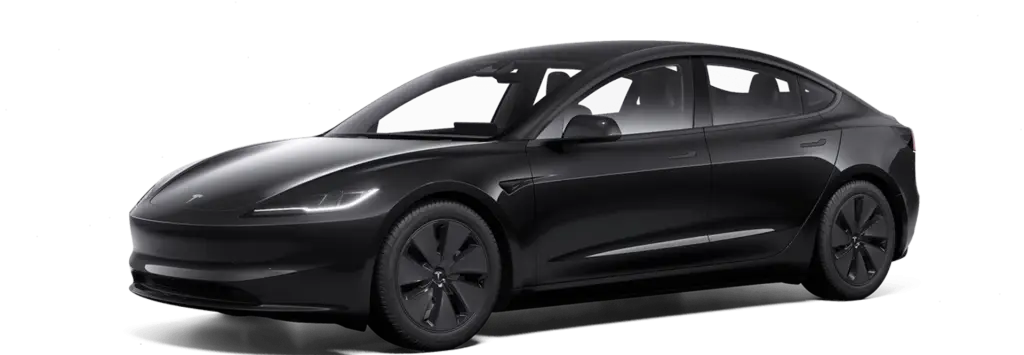
Purchase price 57 490 €
(list price excluding bonuses)
Leasing with no deposit for professionals from €649/month
- Range (WLTP): 528 km
- Acceleration (0 to 100 km/h): 3.1 sec
- Fast charge (from 20 to 80 %): 20 min
smart #1 Pro+

Purchase price 43 315 €
(list price excluding bonuses)
- Range (WLTP): 420 km
- Acceleration (0 to 100 km/h): 6.7 sec
- Fast charge (from 20 to 80 %): 27 min
Peugeot e-308 54 kWh

Purchase price 43 900 €
(list price excluding bonuses)
Leasing with no deposit for professionals from €498/month
- Range (WLTP): 409 km
- Acceleration (0 to 100 km/h): 9 sec
- Fast charge (from 20 to 80 %): 23 min
When leasing a fleet of electric cars for your business, there are some common mistakes that could damage your investment. Here are a few tips to help you avoid unpleasant surprises.
The first step is to carefully compare offers from different service providersThis is because the conditions, rates and services included vary widely.
It is equally important to read each clause of the leasing contract carefully. Ignoring certain conditions could expose you to unexpected costs or significant limitations. In this context, call on a leasing professional can prove invaluable in helping you to navigate the various offers and avoid potential pitfalls.
A common mistake is to underestimate annual mileageThis can lead to costly penalties if the limits are exceeded. Similarly, rigorous maintenance of the vehicle throughout the term of the contract is essential to avoid repair costs on return.
Read our article about :
Among the mistakes to avoid when taking out a leasing contract, not using a professional can be problematic. Here are some examples, There are several key criteria for choosing the most suitable leasing company.
First of all, check the range of vehicles available to make sure that the model you want is available.
Next, examine the terms of the contract Make sure it is transparent, with clear details of :
- duration,
- rents,
- authorised mileage
- and the conditions of termination.
La the company's reputation is also fundamental A reliable company offers good customer service and transparent prices, and its customer reviews can provide valuable information about the quality of the service.
Finally, when it comes to comparing leasing options, there are 2 main types available: long-term leasing and leasing with an option to buy.
As a reminder, full service leasing is often recommended for users who want to avoid the hassle of resale and benefit from maintenance included, while leasing may be preferable for those who drive little and may wish to buy the vehicle at the end of the contract.
Read our article about :
For companies considering leasing a fleet of electric vehicles, the cost is a major concern. Despite the advantages of electric cars, such as lower running and maintenance costs, there are still a number of issues to be resolved. additional costs may deter.
Before making a choice, it is essential to audit the company's needs in order to select the most suitable models in terms of autonomy and equipment requirements.
In addition, a good driver training on the specific characteristics of electric vehicles and a regular preventive maintenance are also crucial to optimising costs.
Finally.., use tracking technologies to analyse data and manage the fleet, maximising efficiency and reducing costs.
Read our article about :
Obtaining finance for an electric vehicle can be complex, and sometimes applications are turned down for a variety of reasons.
For professionals, there are a number of factors that can be obstacles to obtaining a leasing offer, such as :
- its seniority,
- the company's financial health,
- and compliance with the conditions of use of the vehicle.
What's more, the young companies have to prove their solvency with projected balance sheets and documents attesting to financial stability. Companies that have received public support must also demonstrate their long-term investment capacity.
Applications for funding must be accompanied by specific documents depending on the type of applicant. For companies, you will need to provide financial accounts and articles of association.
Additional requirements apply depending on the value of the investment and the type of application.
That's why preparing your application well, providing proof of solvency and complying with the specific conditions will maximise your chances of obtaining finance for an electric vehicle.
Read our article about :
That's right, getting a leasing contract can be difficult for young companiesThis is especially true if the company's balance sheet is only recent and its finances are still unstable. Financing organisations prefer companies that have been in business for at least 2 to 3 years in order to assess their solvency.
For young companies that do not meet the criteria for long-term leasing, LMD is an alternative because it does not require a balance sheet, which simplifies access for new businesses.
Read our article about :
Conclusion
In conclusion, the leasing of electric cars is a very attractive option. a valuable opportunity for professionals wishing to add environmentally-friendly vehicles to their fleet while maintaining financial flexibility.
In addition to contributing to the energy transition andimprove your CSRyou benefit from turnkey solution and various tax benefits.
Whether you're considering a full- or part-liquidation contract or a leasing agreement, these solutions can be tailored to your company's specific needs while staying within your budget.
To maximise the benefits of this approach, it is essential to understand :
- eligibility criteria,
- the necessary documents,
- and the terms and conditions of each leasing option.
That's why we encourage you to explore our other blog posts, where we delve deeper into these topics and much more, to give you a comprehensive overview and practical advice tailored to your professional situation.
Beev has positioned itself as a strategic partner in this field. With our expertise in electric vehicles and our tailor-made leasing solutions, we can help you to choose the formula best suited to your needs and to optimise your investment.
Our advisers are there to offer you personalised support and guide you through the process.
Together, we can move your business towards more sustainable and efficient mobility.
Monday to Friday
9am - 12.30pm - 2pm - 7pm

































